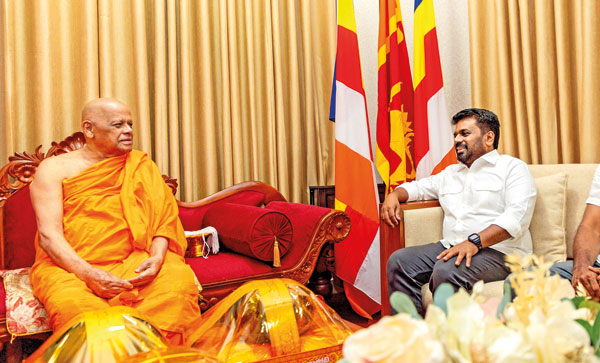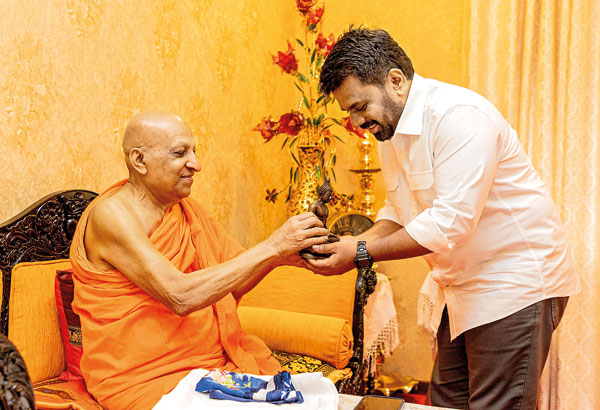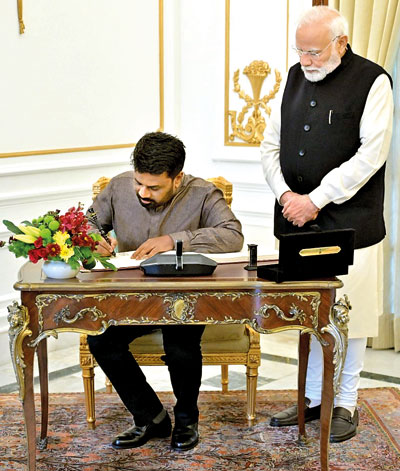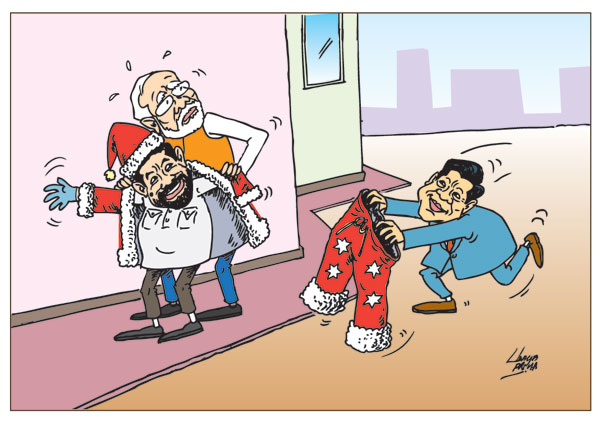Columns
- NDF (SLFP) members abandon cylinder and take up chair to contest future elections
- SJB leader Premadasa faces criticism over outside interference in party affairs
- Hakeem accuses government of concealing full details of Covid-19 cremations under the cover of medical ethics
- June 2024 cabinet paper reveals blunders Gotabya Rajapaksa Govt. made over Covid-19 cremations
By Our Political Editor
The visit of President Anura Kumara Disanayake to India continues to dominate the media. The most important takeaway, for the first time since 1987, is the absence of any reference in the Joint Statement on matters relating to reconciliation.
Since Indian Prime Minister Rajiv Gandhi and Sri Lanka’s President, J.R. Jayewardene signed the Indo-Lanka Accord that year, a reference to Colombo’s full implementation of the 13th Amendment to the Constitution had become almost routine. Among others, it would have conferred police and land powers to the Provincial Councils, an instrument created by that accord. The backdrop to its emergence was the brutal ethnic violence of July 1983, a decade in which the Janatha Vimukthi Peramuna (JVP), the main player in the NPP was virulently anti-Indian.
The references previously, though not meant that way, did cause an imaginary divide. In the country’s south, some perceived it as the government in New Delhi pressurising Colombo—a move that Tamil political parties welcomed. So much so, the position has also been reiterated at sessions of the UN Human Rights Council in Geneva when Sri Lanka is under discussion. The development underscored both the diplomatic and political significance that placed President Anura Kumara Disanayake, much to the chagrin of many of his predecessors, on a higher pedestal.
How it all began in two weeks is of importance. A source in the National People’s Power government explained that a draft of the Joint Statement was being shuttled between New Delhi and Colombo. This was ahead of President Disanayake’s visit so both sides could agree on the topics that should remain. There was in fact a reference to Indian Prime Minister Narendra Modi urging Sri Lanka to fully implement the 13th Amendment to the Constitution. This was a knotty issue for Colombo since President Disanayake, both during the campaigns for presidential and parliamentary elections, did not make any pledges when he addressed rallies in the north. He only urged voters to support him and thus help develop the north if he won. When Colombo first broached the subject of leaving out the references, the source said, making clear New Delhi’s stance that the matter would have to go before Premier Modi. This was because he had already approved that inclusion. “More talks and we made an appeal to place the matter together with the other suggestions,” the source said adding that “the Premier gracefully agreed.”
Behind the scenes, the NPP leaders learnt that Premier Modi, in doing so, had acknowledged the endorsement by Jaffna voters of President Disanayake and his government. From a mere 7% during the presidential election, it had shot up during parliamentary elections to 25% of the votes in the Jaffna polling division alone. In the Jaffna district, the NPP won eight polling divisions out of eleven.

Returning from India, President Anura Kumara Disanayake meets the Mahanayakes of the Malwatte and Asgiriya chapters to brief them on his official visit to India this week.
India, however, has not abandoned its original position. Premier Modi, who addressed a joint news conference with President Disanayake, said “…we talked about reconstruction and reconciliation in Sri Lanka. President Disanayake apprised me of his inclusive perspective. We hope that the Sri Lankan government shall fulfil the aspirations of the Tamil people. And that they shall fulfil their commitment towards fully implementing the Constitution of Sri Lanka and conducting Provincial Council Elections.” He added that he had “assured President Disanayake that India shall stand as a trusted and reliable partner in his efforts towards nation building…” The NPP source said the President had declared in his policy statement in Parliament that he would not allow the resurgence of divisive racist politics. A new Constitution he has proposed will consider measures towards reconciliation. For this purpose, all stakeholders will be consulted, the source added.

Addressing a news conference last Monday, India’s Foreign Secretary Vikram Misri also referred to reconciliation. An accomplished diplomat, he was a onetime Indian Deputy High Commissioner in Sri Lanka. He came to Colombo after serving a stint at the Indian Prime Minister’s Office (PMO). Misri said President Disanayake did in “fact draw attention during the discussions, on several occasions, to the mandate he has received. The weight, significance and importance of that mandate, I think you understand that he is essentially referring to the extent of that mandate. Both the numerical weight of that mandate as well as the spatial distribution of that mandate he has received support from all corners of the country. Therefore, there is an expectation now from him to respond to those expectations.”
The NPP source, familiar with what transpired in New Delhi, revealed that during talks with Premier Modi, President Disanayake spoke with great candour. “There was a touchy issue about which I cannot speak. I can say that he was frank enough to point out that Buddhist religious leaders were not in favour. His position was well taken,” the source added. India has assured President Disanayake that it would extend help in launching confidence-building measures both in the north and in the south that would help towards reconciliation and development, the source added. One of the remarks that Disanayake quipped that raised eyebrows, the source said, was when he termed the 13th Amendment to the Constitution as a product of the previous Congress government in New Delhi. The message was clear—it was not the brainchild of the ruling BJP. On Friday, President Disanayake was in Kandy briefing the Mahanayake Theras of the Malwatte and Asgiriya Chapters on matters relating to his India visit.

In New Delhi, at the Indian Prime Minister’s official residence, President Disanayake signs the guest book
President Disanayake returned to Colombo on Tuesday night. During his flight from New Delhi, he walked along the aisle of the SriLankan Airlines A-320 aircraft, which was cruising at some 38,000 feet, talking to almost every Economy Class passenger, posing for selfies taken on mobile phones and patting the back of an elder or two. On Wednesday, he was in Parliament. He held an hour-long meeting with party leaders. Among those taking part were Sajith Premadasa, Rauff Hakeem, Rishad Bathiuddin and Ravi Karunanayake. After the exchange of pleasantries, he sought their help to conduct sittings of parliament by engaging in constructive criticism. Hakeem, Premadasa and Karunanayake made brief speeches. The trio emphasised the need to ensure equitable representation of opposition party representatives in parliamentary committees. They claimed that it was at present weighted towards the government.
Another issue that transpired in Parliament this week was the cremation of victims of Covid-19. A question listed in the Order Book under the name of Sri Lanka Muslim Congress leader and Attorney-at-Law Rauff Hakeem said:
To ask the Minister of Health and Mass Media,—
(a) Will he inform this House of the —
(i) number of bodies cremated following the government’s decision to dispose of the bodies of persons who died of COVID-19 infection by cremation.
(ii) name, gender, race, religion, name of the next of kin, address, date, and place of cremation of each deceased person, separately; and
(iii) death certificate number, the date of registration of death and the relevant district for each of the deceased, separately?
(b) If not, why?
Health and Media Minister Nalinda Jayatissa gave the following answers:
Question No i: The number of persons whose deaths were caused by COVID 19 and cremated thereafter is 13,183.
Question No ii: Under the Right to Information Act and in accordance with medical ethics the required information cannot be provided.
Question No iii: Does not come under the purview of the Health Ministry and it is advisable to get the relevant information from the Registrar General Department.
Qestion No iv : Not relevant
Hakeem declared that he was surprised as the deaths of Muslims due to COVID-19 were a sensitive issue. “The secretary of your party present here, Dr Nihal Abeysinghe, who is an epidemiologist, is the person who voiced his opinion when others were silent on the matter. We should be thankful for that. The government should have such statistics; they should be made public. Concealing this information is a black mark on the Health Ministry. Even the newly appointed secretary of your ministry, at that time justified the moves taken. That is one of the reasons your government got such a large mandate, particularly from the Muslim community. Therefore provide us with the true information. Do not hide behind the Right to Information Act. Therefore please provide this information.
“This is a sensitive issue. Taking decisions about the dead is a reflection of the values of that society. There may have been different opinions about the spread of COVID-19 at the initial stages. Those doubts were clarified in a short period. Decisions taken by the government at that time caused issues. The decision to bury Covid-19 victims in Ottamavadi caused lots of issues,” Hakeem said.
Minister Jayatissa: We are sensitive to this issue. We should be ashamed of the decisions taken at that time. That is why we voiced our concern at that time that such political decisions should not be taken. This is not a matter of concealing information. This is an issue about medical ethics and inability to provide information due to RTI laws. We have no right to conceal information. We will not allow this fault to take place again. We should be ashamed as a country about the decision.
Hakeem: My second supplementary question is…. The minister says that the obstacle to providing the information is because of medical ethics. I am not aware of such ethics. If there are such ethics show them to us, only what we are asking is the list of names of persons who died of COVID 19 and were cremated. How can that come under the code of ethics. I am surprised about that. It may be a mistake of the previous government. The former Government also apologised for this matter.
The exchange of words over the issue of cremation of Covid-19 victims brings back memories of how three former ministers—M.U.M. Ali Sabry, Minister of Foreign Affairs, Jeevan Thondaman, Minister of Water Supply and Estate Infrastructure Development and Wijeyadasa Rajapakshe, Minister of Justice made a public apology. Speaking on behalf of the previous government, they claimed they would “take steps to reassure the people of Sri Lanka that future decisions in similar circumstances will be based on merit, without being influenced by extraneous factors.” A decision for an apology followed a joint cabinet memorandum the trio submitted on June 22, 2024. The apology was timed for the September 21 presidential election with an eye on Muslim votes. Yet, none of the facts placed before the cabinet were told to the public at that time. The apology had little effect too.
Here is a description in the cabinet memorandum, seen by the Sunday Times, that explains the blunders made. “Sri Lanka implemented a mandatory cremation policy during this time (i.e. Covid-19), which was established and implemented by an Expert Committee appointed by the Health Ministry. The committee was led by Dr Channa Perera, JMO (Judicial Medical Officer).
“The policy of mandating cremation for Covid-19 victims was deemed irrational, unjust and unreasonable and received widespread condemnation from the international community.”
Note: Foreign Minister Sabry was a member of President Gotabaya Rajapaksa’s cabinet which implemented the move. If he did, indeed, protest at that time and said the measures were “unjust and unreasonable,” there is no evidence to confirm. He continued as Foreign Minister.
The description continued “However, Sri Lanka continued with its policy of mandating cremation despite:
(i) The World Health Organisation (WHO) has explicitly disseminated guidelines affirming that there is no scientific evidence to prohibit burial as a means of disposing the bodies of those who have succumbed to Covid-19,
(ii) Distinguished experts, both in Sri Lanka and internationally, including the Sri Lanka Medical Association and Prof. Malik Peiris, a globally acclaimed virologist of Sri Lankan origin, having advocated for the permission of burial,
(iii) UN agencies urging Sri Lanka to reconsider the ban and permit burial; and
(iv) The Organisation of Islamic Countries (OIC) formally denouncing this position and urging the Government of Sri Lanka to reconsider the above measures, severely damaging the cordial relations between Sri Lanka and member countries of the OIC.
“Consequently, the policy, perceived as discriminatory and driven by non-scientific and illogical reasons, had a significant negative impact on Sri Lanka’s reputation in the global stage, especially within the Muslim and Christian communities. Moreover, the policy caused deep mistrust, trauma, and societal polarisation within several populations, especially Muslims and Christians and certain segments of Buddhists and Hindus whose religious and cultural convictions firmly endorse burial as the exclusive method of body disposal, a practice that has long been observed by them…
In February, 2021, the cabinet memorandum said, “burial was eventually authorised with strict restrictions at a designated site in Ottamavadi, Batticaloa, away from the customary burial destination for such individuals. It has been verified that a cumulative total of 3614 individuals who succumbed to Covid-19 have been buried in these burial sites. The distribution was: Muslims 2992, Buddhist 287, Hindu 270, Catholic 85. The number of males were 2225 while females formed 1409.”
The memorandum noted, “There is now a widespread consensus supported by scientific evidence that there was no justifiable rationale for implementing and maintaining the mandatory cremation policy.” It adds: “Adhering to proper burial procedures, such as deep burial in sealed body bags and as was prescribed by the WHO at that time, would have removed any potential risk of environmental contamination.” The ministers were also given copies of a report titled Effects from Burial of Covid Bodies in Groundwater Contamination. China-Sri Lanka Joint Research and Demonstration Centre for Water Technology had conducted it. The report said, “Based on the review, it can be concluded that the potential risk of groundwater pollution from buried Covid-19 infested bodies following proper guidelines during the pandemic is negligible.”

National list crisis in SJB
There were some noteworthy political developments too this week. One relates to the crisis now brewing in the Samagi Jana Balavegaya (SJB) over how their leader, Sajith Premadasa, managed the issue of the five national list vacancies. Other than the slot given to party General Secretary Ranjith Madduma Bandara, his critics in the party say, he vacillated in filling the vacancies. Here again, Madduma Bandara had to be given a slot early since he had to be sworn in so he could obtain his diplomatic passport as an MP for a visit to Laos. Premadasa hurriedly filled the other four vacancies after the District Court in Colombo ruled that no appointments should be made without the Sri Lanka Muslim Congress (SLMC) nominee, Nizam Kariappar, being included. It came to light, contrary to his assertions during rallies ahead of parliamentary elections, that he had signed pledges with the SLMC and two other partner parties to appoint their nominees to the national list slots. That is exactly what he did for fear of further court action.
One of the issues Premadasa is facing is over the role of his family friend, Lakshman Fonseka, in the party. Influential sections of the party are angered that Premadasa’s decisions are influenced by Fonseka, a charge which the SJB leader has denied. At a recent meeting, he declared that he could not prevent well-wishers from assisting him as well as the SJB.
The latest to make the accusation is Hirunka Premachandra, a former SJB parliamentarian who was also an aspirant for a national list slot. She leads the SJB Women’s Wing. At a news conference this week, she was asked about the role of Fonseka. Her response: “As far as I know, Lakshman Fonseka is abroad these days. People who do business should do business. People who do politics should do politics. He is a good friend of our leader. In this situation, he has helped the party. If there are different views among the party hierarchy, it is not good for the leader. They will think someone else is making decisions. To keep the friendship, the leader should take the decisions. Then the issues will be solved.”
She was asked whether young people should take over the party. She said, “In my team, there are young and the old. We need the old also. We can guide the newcomers with their experience. In my team, there are young and old women too. It is a mix. The young should follow the elders. There are a lot of new faces in the NPP in Parliament. An efficient lot has come in. Like that, if our party also gives a chance to the others, they can come up. The NPP has given them the opportunity to shine themselves in the electorate. Our party should take a lesson and encourage members to flourish in the electorates. Our party members must be briefed on issues so they will have knowledge during debates. Young members should be trained by our party leadership.”
Cracks in the cylinder
Is the New Democratic Front (NDF), the grouping of parties that contested the presidential and parliamentary elections under the gas cylinder symbol, breaking up? So it seems judging by a meeting two key partners of the front held at the Sri Lanka Freedom Party (SLFP) headquarters in Darley Road. Besides the SLFP, others were from the New Alliance. The meeting was chaired by Anura Priyadarshana Yapa, a former minister in the Sri Lanka Podujana Peramuna (SLPP) government. Those taking part included Nimal Siripala de Silva, Mahinda Ameraweera, Nazeer Ahmed, Lasantha Alagiyawanna, Nimal Lanza, Anupa Pasqual, Chamara Sampath Dissanayake, Faiszer Musthapa and Jagath Priyanka. The meeting has been titled the Leadership Council of the Podujana Eksath Peramuna (PEP).
A decision made at this meeting is for backers of the PEP to contest the upcoming local council elections. President Disanayake has already announced that these elections will be held before the Avurudhu in April to be followed later by elections to Provincial Councils. It was decided to call for applications from prospective candidates. The PEP will field them under the chair symbol, a clear indication that they will not go along with the gas cylinder symbol and the NDF. The meeting also discussed President Disanayake’s visit to India. Speakers claimed that full details of the visit have not been disclosed to the people and decided that they would hold public meetings to educate the people.
The proposed local council elections after three months raise questions in respect of other opposition political parties. The SJB will field its own candidates. What of the United National Party (UNP), which remains in a totally disorganized state? Its chairman, Wajira Abeywardena, has declared that the party will field candidates under the elephant symbol. The time would be woefully inadequate to give life to a once renowned and respected political party. The matter was discussed this week by leader, Ranil Wickremesinghe, with senior members of the party. He called upon them to prepare their proposals and have them ready when he returns from a trip to India. He left for New Delhi yesterday. With the NDF becoming an unlikely proposition, how they propose to get over the issue is unclear. All these developments notwithstanding, the NPP appears to be in a comfortable position. Its parliamentarians have already been briefed on the strategy and its candidates have been earmarked. Will the outcome be a repeat of the parliamentary elections?

With opposition in disarray, NPP smells victory at upcoming local council polls
View(s): 189